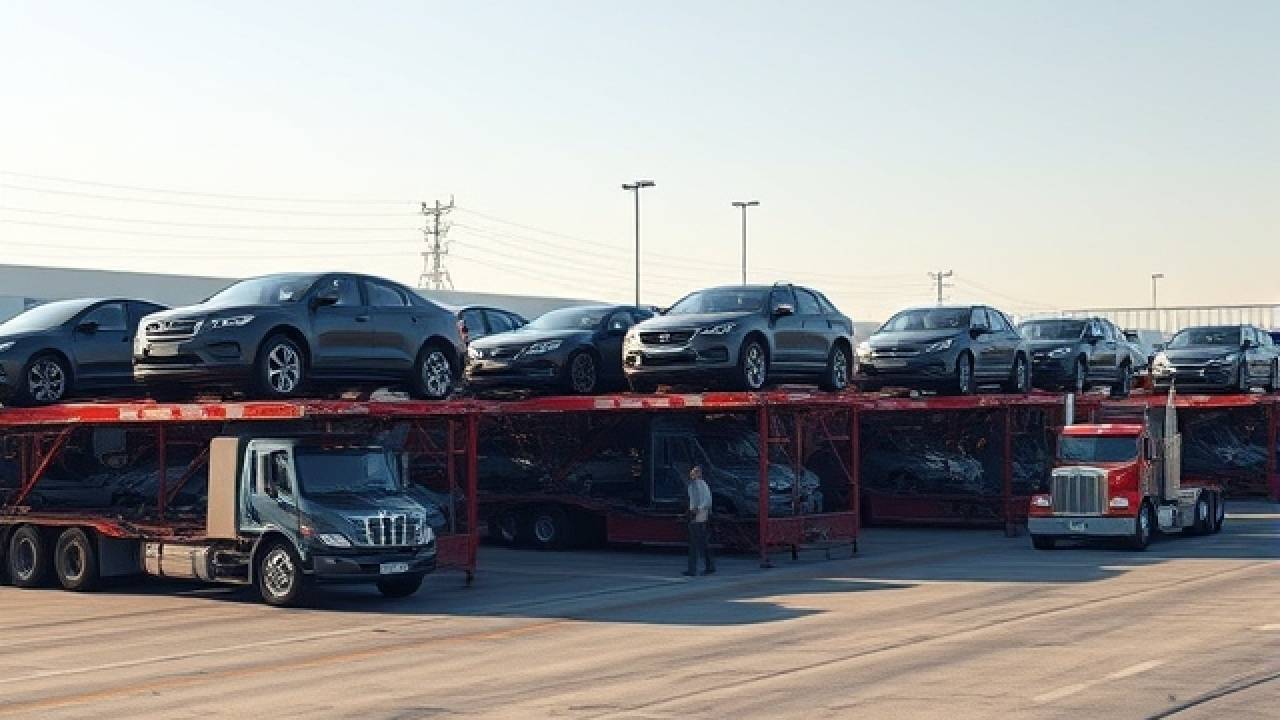Monday Car Shipping Spikes are a standout phenomenon that underscores the complexity of logistics management in the automotive industry. While some might assume car shipping demand to be consistent throughout the week, data reveals that the start of the workweek often experiences a sharp increase. This pattern prompts intriguing questions regarding the underlying causes and implications for supply chain optimization.
Historically, these Monday Car Shipping Spikes can be attributed to various factors including dealerships refreshing inventory to attract early-week shoppers and businesses aligning their operations to capitalize on peak productivity periods after the weekend. A study recently highlighted that car shipments on Mondays can see increases of up to 20% compared to other weekdays. Addressing this surge efficiently involves strategically timed logistics planning and leveraging advanced forecasting methods to ensure fleet availability without inflating operational costs.
Monday car shipping spikes are primarily due to increased demands from dealerships replenishing their inventory at the start of the week, synchronized shipments post-manufacturer weekend closures, and logistics strategies aimed at optimizing weekly transportation efficiency. These patterns demand strategic planning and resource allocation by shipping companies.
Monday Car Shipping Spikes: An Overview
Have you ever noticed more car carrier trucks on the roads on Mondays? There’s a reason for that. Many car dealerships receive new shipments of vehicles at the start of the week. This is to ensure they have a full lot for customers visiting throughout the week. Mondays have become the busiest days for car shippers, reflecting a notable spike in their activity.
This Monday Car Shipping Spikes is not just about filling the car lots. For logistic companies, it helps streamline their operations by consolidating shipments. It’s more efficient to move many vehicles at once rather than spreading them out over the week. This concentration reduces costs and improves scheduling for the shipping companies.
But why Mondays? Over the weekend, dealerships assess their sales and inventory needs. By doing this, they can order what they need so new cars arrive just in time for the new week. This makes Monday a practical choice for receiving new shipments. This timing helps dealerships to be fully stocked for potential buyers right from the start of the week.
While it might seem like a simple business decision, Monday car shipping spikes have broader impacts. They affect traffic patterns and even fuel consumption rates for transport companies. Understanding these nuances helps both consumers and professionals in the automotive industry. It’s a peek into how strategic decisions are made in car sales and distribution networks.
Underlying Reasons for Monday Car Shipping Spikes
One main reason for car shipping spikes on Mondays is dealership inventory management. Over the weekend, sales typically increase, and inventories can drop significantly. To ensure lots are full ahead of the week, dealerships often schedule large shipments for Monday. This system helps them maintain a good selection of vehicles for customers who start shopping early in the week.
Another factor is the synchronized scheduling between manufacturers and dealerships. Many manufacturers shut down over the weekend. They then ramp up shipments early in the week to distribute newly assembled vehicles. This timing ensures that the shipping vehicles are fully utilized, which is key to cutting transportation costs and maximizing efficiency.
Additionally, Mondays are strategically chosen for logistical practicality. Distributing cars on this day allows logistics companies to optimize their routes and schedules across the week. It’s more efficient to dispatch full loads at the start of the week rather than splitting them over several days. This method reduces fuel consumption and maximizes delivery efficiency.
Finally, customer buying patterns also play a role. Many customers browse car lots over the weekend without finalizing their purchase decisions. Knowing this, dealerships prepare by stocking up on popular models they noticed were of interest over the weekend. By accommodating consumer interest quickly, dealers can boost their sales numbers early in the week.
Impact of Monday Car Shipping Spikes on Logistics
The sharp increase in car shipments on Mondays presents unique challenges and opportunities for logistics companies. These spikes demand precise coordination and planning. Shipping companies must ensure they have enough drivers and transport trucks ready at the beginning of the week. This often means adjusting schedules and routes to handle the increased load efficiently.
Logistically, Monday Car Shipping Spikes can lead to overcrowded shipment routes and delivery points. This congestion may cause delays and increased waiting times for loading and unloading vehicles. To mitigate these issues, logistics companies often employ advanced scheduling software and real-time tracking systems. These tools help them manage the flow of shipments dynamically, ensuring timely deliveries.
Moreover, the demand for faster and more efficient service on Mondays has spurred innovation within the transportation sector. Companies are increasingly turning to technology solutions like automated scheduling and drone monitoring. Some are exploring electric and autonomous transport vehicles to boost efficiency and reduce the environmental impact of heavy shipping days.
Ultimately, the spikes on Mondays also affect how logistics companies strategize for the rest of the week. They have to balance resources, such as manpower and vehicle availability, to ensure smooth operations daily. This might involve shifting some deliveries to quieter days or increasing manpower temporarily to handle the rush. These adjustments help maintain consistency and reliability in service delivery throughout the week.
How Companies Manage Monday Car Shipping Spikes
To handle the rush of car shipments every Monday, companies employ several effective strategies. One common approach is pre-planning weekend logistics. They optimize routes and schedules ahead of time to ensure drivers and vehicles are well-prepared for the increase in load. This often involves holding planning sessions where potential issues like traffic and route closures are discussed.
Furthermore, companies often enhance their staffing on Mondays to manage the increased workload. This could mean more drivers, logistics coordinators, and support staff on duty. Some larger firms even shift workers from quieter days to Mondays to ensure enough hands on deck. This helps in smooth operations and timely deliveries.
Technology also plays a pivotal role in managing these shipping spikes. Many companies use advanced logistics software to forecast demand and adjust resources accordingly. Real-time tracking and mobile communication tools keep everyone from dispatchers to drivers updated on shipment statuses, helping to navigate any sudden changes or challenges.
Investing in training is another key approach. Drivers and logistic staff are often given specific training to handle high-volume days like Mondays. This training includes efficient loading and unloading procedures, customer service, and emergency management. Such preparation ensures the team can handle the extra pressure without compromising on service quality.
Last but not least, collaboration between shipping companies and car dealerships is crucial. Open communication about expected shipment volumes and any special requirements helps both sides manage the Monday spikes more effectively. Regular meetings and updates ensure that everyone is on the same page, which minimizes disruptions and maximizes efficiency.
Strategic Solutions to Counter Monday Car Shipping Spikes
Dealing with the high volume of car shipments on Mondays requires strong strategic planning. One effective strategy is staggered scheduling. By not aligning all shipments on a single day, companies can reduce the pressure on logistics and spread out the workload more evenly throughout the week. This approach helps in utilizing resources more efficiently and maintaining a steadier workflow.
Another solution involves upgrading infrastructure. Investing in more loading docks and larger storage facilities allows companies to handle larger volumes of shipments at once. This can significantly decrease the bottleneck effect on Mondays and speed up the entire shipping process.
- Enhanced technology integration: Using AI and machine learning to predict spikes and adjust resources automatically.
- Partnerships with other logistics companies: Sharing resources like fleets and manpower during peak times can help manage excess demand.
- Customer incentivization: Encouraging dealers to receive shipments on less busy days by offering reduced rates or other perks.
Training staff to handle peak times is also a fundamental solution. Regular training sessions that focus on efficiency and problem-solving can prepare employees for the challenges of Monday spikes. This ensures that staff are not only equipped with the necessary skills but are also adaptable to high-pressure situations.
Finally, continuous process review and adaptation are key. Companies must consistently analyze their Monday operations to identify any inefficiencies or new challenges. Feedback loops involving drivers, dispatchers, and management can foster ongoing improvements, making each Monday more manageable than the last.
Conclusion
Understanding the dynamics behind Monday car shipping spikes provides crucial insights for both logistics companies and dealerships. By strategically managing these spikes, businesses can enhance operational efficiency and customer satisfaction.
This optimization not only smoothens the supply chain but also supports the economic stability of the automotive sales industry, leading to a more robust market environment.
FAQ:
What are Monday Car Shipping Spikes?
Monday Car Shipping Spikes refer to the significant increase in car shipments that occur on Mondays, primarily due to dealerships replenishing their inventory.
What does the Monday car shipping spikes provides?
Understanding the dynamics behind Monday car shipping spikes provides, crucial insights for both logistics companies and dealerships.
Why do dealerships receive car shipments on Mondays?
Dealerships receive car shipments on Mondays to ensure they have a full inventory for customers visiting throughout the week, following weekend sales and inventory assessments.







